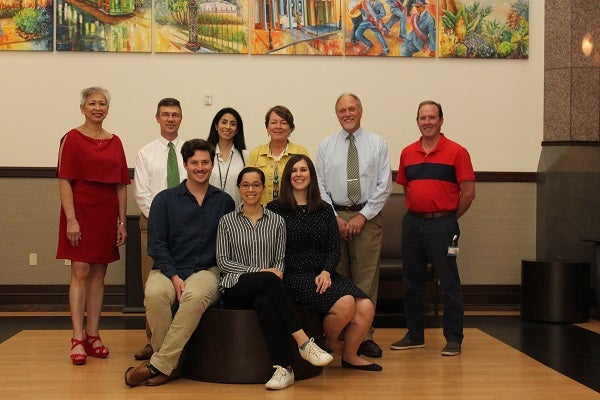
Back row, faculty advisors: Dr. Maureen Lichtveld, Dr. John Schieffelin, Dr. Claudia Herrera, Dr. Dawn Wesson, Dr. Richard Oberhelman, and Dr. Jeffrey Wickliffe. Front row, Fogarty Global Health Fellows: Matthew Ward, Lissa Soares, and Monika Dietrich.
A record four Tulane affiliates have been named as Fogarty Global Health Fellows for 2019-2020. Fellows participate in collaborative, mentored, global health research training in low- and middle-income countries.
The Global Health Fellows is the flagship program of the Fogarty International Center at the National Institutes of Health (NIH). The program is coordinated by six consortia, and Tulane is a member of the UJMT consortium, along with the University of North Carolina, Johns Hopkins University, and Morehouse School of Medicine. Dr. Richard Oberhelman and Dr. Pierre Buekens serve as Tulane’s co-investigators for the consortium.
For his fellowship Tropical Medicine doctoral student Matthew Ward will work with Dr. Dawn Wesson, Dr. Claudia Herrera, and Dr. Richard Oberhelman on a project to characterize the parasitic agents of Chagas disease in Bolivia. Oberhelman’s Peru-based collaborators from Johns Hopkins and Cayetano University will also work with Ward on the project.
Monika Dietrich is a third-year fellow in pediatric infectious diseases, and she will work with Dr. John Schieffelin to study cytomegalovirus reinfection of pregnant women in Sierra Leone. Shieffelin is an assistant professor of medicine and pediatrics as well as an adjunct professor of tropical medicine.

Two doctoral students in Global Environmental Health Sciences were funded for research projects in Suriname. Cecilia Alcala will work on pesticide exposure of women of reproductive age, while Lissa Soares will consider the role the consumption of river fish plays in toxin exposure of pregnant women. Suriname was added just this year as an approved UJMT-affiliated site. Both students will work with Dr. Maureen Lichtveld, who has an extensive research enterprise in that country.
The one-year fellowship provides full funding to the fellows, including stipend, travel expenses, research funds, and insurance, as well as full coverage for a one-week training program at NIH with up to 100 other consortia trainees.
